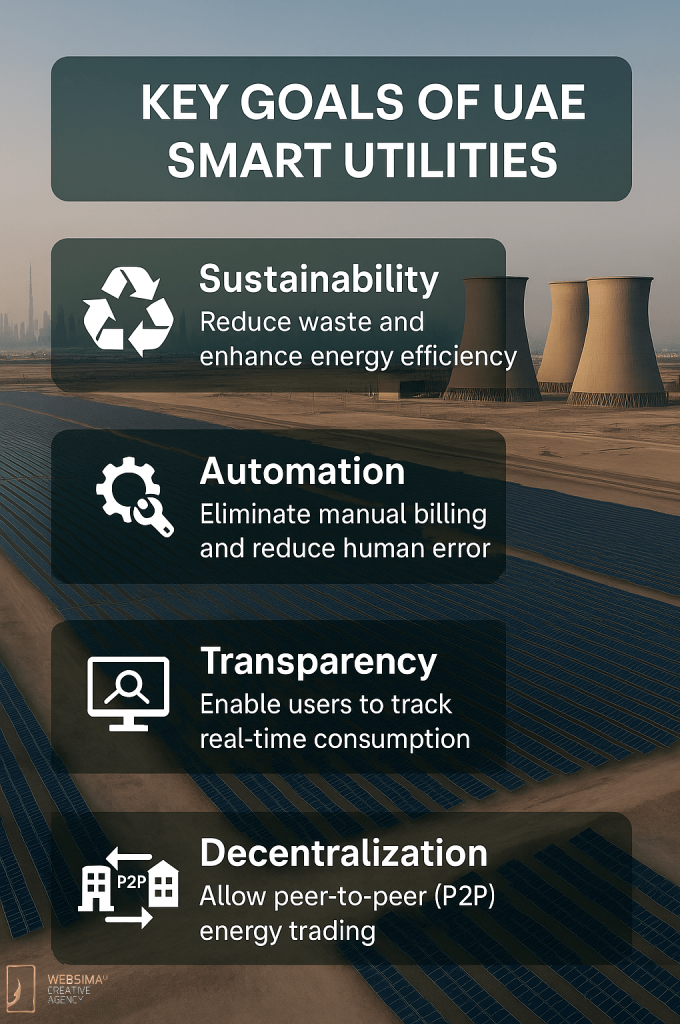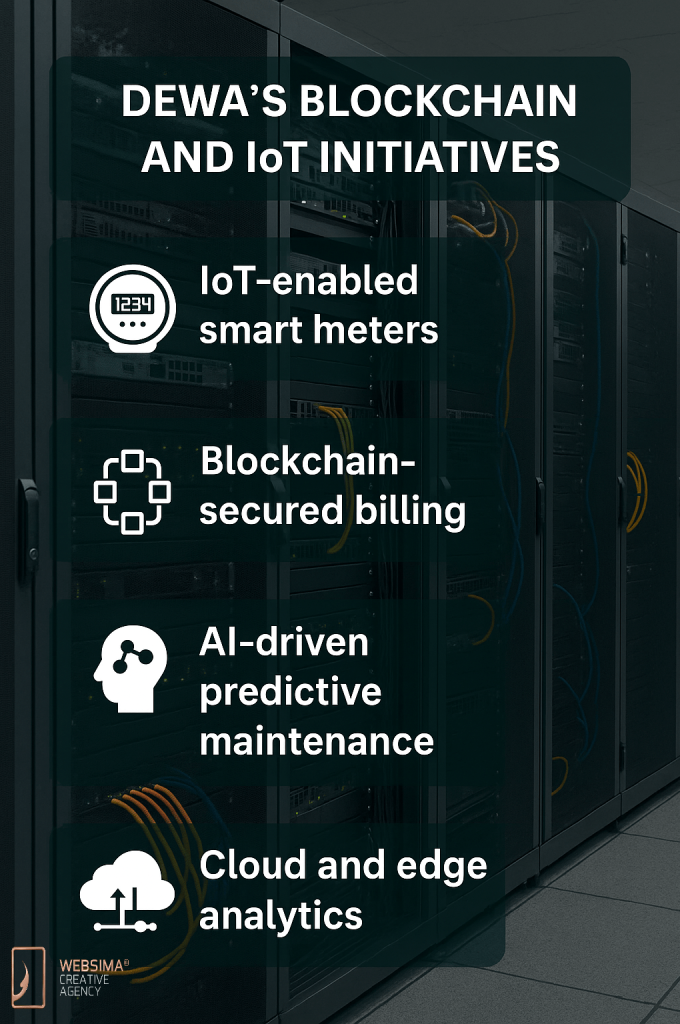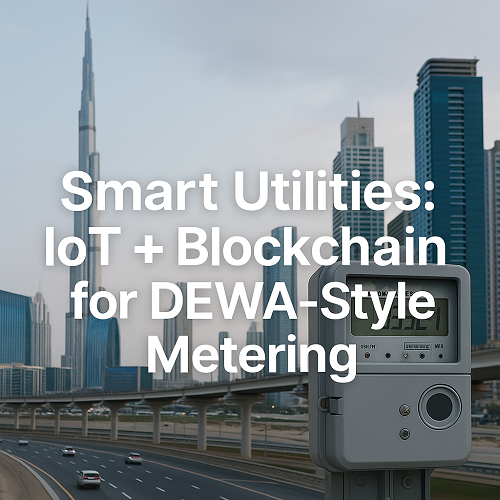Table of Contents
- Introduction
- Understanding Smart Utilities in the UAE
- How IoT and Blockchain Reinvent Utility Management
- Key Components of a Blockchain-Enabled Smart Utility System
- DEWA’s Blockchain and IoT Initiatives
- Real-Time Transparency and Billing Automation
- Benefits of IoT Blockchain Utilities in the UAE
- Case Study: Dubai Electricity and Water Authority (DEWA)
- Risks and Challenges of Blockchain IoT Integration
- Common Mistakes to Avoid in Implementation
- Future Outlook: Smart Grids and Decentralized Energy Markets
- Frequently Asked Questions (FAQs)
- Final Thoughts
- Websima’s Advisory on Blockchain Utility Projects
Introduction
Dubai’s ambition to become one of the world’s most sustainable and digitally integrated cities has driven the evolution of its smart utilities sector.
Initiatives by the Dubai Electricity and Water Authority (DEWA) and Smart Dubai show how IoT (Internet of Things) and blockchain technology are merging to build a transparent, decentralized, and efficient utility ecosystem.
From real-time energy metering to blockchain-based billing, this integration ensures every kilowatt, drop of water, or gas unit consumed is verifiable, recorded, and billed automatically—with minimal human intervention.
The groundwork for tokenized energy infrastructure is underway.
Our UAE site is now being built. Foundation, then energification, and deployment. Setting the stage for a new class of physical infrastructure that generates real, onchain yield. The unified layer where RWA, DeFi,… pic.twitter.com/OsW57gOv69
— PinLink (@PinLinkAi) October 13, 2025
This article explores the foundation of IoT blockchain utilities in the UAE, highlighting how DEWA-style metering, smart contracts, and immutable ledgers are shaping a new era of trust and transparency in energy management.
Understanding Smart Utilities in the UAE
Smart utilities are digitally connected infrastructures that use real-time data to manage the production, distribution, and consumption of electricity, water, and gas.
In the UAE, these systems are crucial to Dubai’s Smart City Vision and the UAE Net Zero 2050 Strategy.
Key Goals of UAE Smart Utilities

- Sustainability: Reduce waste and enhance energy efficiency.
- Automation: Eliminate manual billing and reduce human error.
- Transparency: Enable users to track real-time consumption.
- Decentralization: Allow peer-to-peer (P2P) energy trading.
Projects like Digital DEWA, part of Dubai’s 10X initiative, are examples of how technology is driving this vision. According to PwC Middle East’s 2024 Utilities Report, over 70% of UAE energy firms are investing in IoT-enabled systems with blockchain pilots in progress.
How IoT and Blockchain Reinvent Utility Management
IoT sensors collect data in real time, while blockchain guarantees this data remains secure, immutable, and auditable.
Together, they create an autonomous metering and billing ecosystem that eliminates disputes and inefficiencies.
IoT Layer
Smart meters and sensors record key metrics such as:
- Electricity consumption (kWh)
- Water flow (liters per second)
- Voltage, temperature, and leakage data
This information is transmitted securely to edge or cloud storage.
Blockchain Layer
The blockchain acts as a tamper-proof ledger of consumption and payment data.
Smart contracts execute billing automatically once pre-defined conditions—like usage thresholds—are met.
Integration Layer
AI dashboards and analytics tools visualize and forecast consumption trends, allowing utilities and regulators to monitor system health and consumer patterns.
The outcome: a self-executing, transparent, and decentralized utility infrastructure.
Learn more about the broader IoT blockchain integration across Dubai’s smart infrastructure projects.
Key Components of a Blockchain-Enabled Smart Utility System
| Component | Description | Example |
| Smart Meters | IoT devices measuring real-time usage | DEWA’s Smart Grid 2.0 |
| Blockchain Ledger | Immutable record of consumption & billing data | Hyperledger, Polygon, or Ethereum |
| Smart Contracts | Automate billing, tariffs & settlements | Usage-triggered billing scripts |
| Digital Wallets | Enable instant payments & tokenized energy credits | CBDC-linked digital wallets |
| Analytics Dashboard | Visualizes performance & consumption trends | AI-driven reporting dashboards |
This integration supports machine-to-machine (M2M) payments, enhancing accuracy and operational efficiency.
DEWA’s Blockchain and IoT Initiatives
The Dubai Electricity and Water Authority (DEWA) is a global pioneer in adopting blockchain and IoT technologies.

- IoT-enabled smart meters
- Blockchain-secured billing
- AI-driven predictive maintenance
- Cloud and edge analytics
Over 2 million smart meters have already been installed. The system automatically captures, validates, and records data on blockchain for accurate, auditable billing.
For full details, visit the Digital DEWA initiative.
Real-Time Transparency and Billing Automation
IoT blockchain utilities in the UAE enable instantaneous billing and verification.
Process Flow
- Smart meter records and encrypts consumption data.
- IoT gateway transmits data to blockchain nodes.
- Smart contract calculates costs and generates invoices.
- Payment is executed via the user’s digital wallet.
- Both parties receive immutable transaction receipts.
This process eliminates billing delays and human error while complying with Dubai’s Blockchain Strategy, which aims for 100% paperless transactions by 2030. Similar smart contract automation is also transforming construction escrow and milestone-based payment systems in Dubai.
Learn more about the policy at the Dubai Blockchain Strategy overview.
Benefits of IoT Blockchain Utilities in the UAE
Enhanced Transparency
Immutable ledgers ensure consumption and billing data cannot be altered, fostering user trust.
Operational Efficiency
Automation reduces administrative overhead and streamlines reconciliation between users and utilities.
Decentralized Energy Trading
Blockchain supports peer-to-peer energy exchange, where consumers can trade excess solar power generated under the Shams Dubai program.
Regulatory Compliance
Automated reporting aligns with Federal Decree-Law No. 20 of 2018 on Anti-Money Laundering and VARA’s digital-asset governance framework.
Environmental Sustainability
IoT-based insights enable smarter consumption and waste reduction, supporting the UAE Net Zero 2050 roadmap.
Case Study: Dubai Electricity and Water Authority (DEWA)
Project: Smart Grid 2.0 + Blockchain Metering Pilot
Timeline: 2022–2024
Objective: Automate metering, data integrity, and billing using blockchain and IoT.
Results
- 2 million+ smart meters connected across Dubai.
- Billing discrepancies reduced by 98%.
- Smart contracts issued automatic invoices and digital receipts.
- Electricity consumption in pilot districts fell by 9.2% due to real-time feedback loops.
DEWA’s model is now being studied by global institutions, including the World Bank Energy Sector Management Assistance Program (ESMAP), as a reference for sustainable digital utilities.
For empirical context, see “A Blockchain Solution for Water and Electricity Management” on ScienceDirect.
Risks and Challenges of Blockchain IoT Integration
While promising, large-scale blockchain-IoT rollouts face several hurdles.
Cybersecurity Vulnerabilities
IoT endpoints are frequent targets for attacks; weak encryption can expose sensitive data.
Scalability Issues
Handling millions of transactions requires Layer-2 scaling or hybrid architectures to prevent latency.
Regulatory Complexity
Blockchain-based billing and tokenized settlements must comply with VARA and Central Bank of the UAE regulations.
Data Interoperability
Integrating legacy systems with blockchain networks remains technically challenging.
Capital Costs
Deploying millions of smart meters and blockchain nodes involves high initial investment.
Common Mistakes to Avoid in Implementation
- Neglecting Data Privacy: Publishing identifiable user data on public ledgers.
- Overengineering: Using public chains where private, permissioned blockchains suffice.
- Weak IoT Security: Failing to implement device-level authentication.
- Insufficient User Education: Users unaware of automated billing rules.
- Ignoring Legal Frameworks: Non-compliance with RERA, DLD, or VARA directives can result in penalties.
For a broader governance perspective, refer to “Blockchain for Governments: The Case of Dubai” via MDPI Sustainability Journal.
Future Outlook: Smart Grids and Decentralized Energy Markets
Dubai’s Clean Energy Strategy 2030 targets 75% renewable power generation by 2050.
Future enhancements may include:
- Tokenized energy credits tradable among citizens and enterprises.
- AI-based predictive grids to balance load dynamically.
- Microgrid ecosystems allowing communities to manage energy autonomously.
- Cross-border blockchain settlements using dirham-backed CBDCs.
The convergence of IoT and blockchain will make utility transparency, efficiency, and sustainability cornerstones of UAE’s digital economy.
For insight into the evolving regulatory framework for digital assets, visit DLA Piper’s analysis on UAE regulations.
Frequently Asked Questions (FAQs)
- How do IoT blockchain utilities improve energy efficiency in the UAE?
IoT blockchain utilities in the UAE collect real-time data through smart meters and securely record it on blockchain networks. This combination enables utilities like DEWA to predict consumption, reduce waste, and optimize power distribution for higher energy efficiency. - What are the benefits of using blockchain for smart utility billing in Dubai?
Blockchain billing in Dubai’s smart utility systems ensures transparency, eliminates billing errors, and automates settlements through smart contracts. Each transaction is verified, immutable, and auditable, boosting trust between consumers and providers. - How does DEWA use IoT and blockchain for smart metering?
DEWA integrates IoT sensors and blockchain ledgers to automate metering, data collection, and billing. The Digital DEWA initiative connects millions of smart meters that record consumption and generate tamper-proof billing records, reducing manual intervention. - Can blockchain handle real-time IoT data in UAE smart grids?
Yes. With scalable solutions such as Layer-2 sidechains and hybrid blockchains, UAE smart grids can process high-frequency IoT data efficiently while ensuring decentralization, transparency, and cybersecurity. - What regulations govern blockchain-powered utility projects in the UAE?
Projects involving blockchain utilities in the UAE must comply with VARA’s Virtual Asset Rulebooks, Federal Decree-Law No. 20 of 2018 (AML/CTF), and Smart Dubai’s data governance framework, ensuring secure and compliant digital infrastructure. - How can Dubai residents trade solar energy using IoT and blockchain?
Under programs like Shams Dubai, residents equipped with IoT-enabled solar meters can tokenize surplus power and trade it on blockchain-based P2P energy platforms. This innovation supports the UAE’s clean energy goals and empowers consumers to participate in decentralized markets.
Final Thoughts
The integration of IoT and blockchain in UAE utilities marks the transition from centralized control to autonomous transparency.
By building on DEWA’s pioneering architecture, Dubai is crafting a future where energy systems are self-regulated, efficient, and sustainable.
These innovations not only enhance billing accuracy and consumer trust but also reinforce the UAE’s reputation as a global hub for smart infrastructure and clean energy innovation.
Websima’s Advisory on Blockchain Utility Projects
At Websima, we guide organizations in designing and implementing blockchain-powered IoT ecosystems for energy, utilities, and infrastructure sectors across the UAE.
Our expertise includes:
- Smart contract architecture for metering and billing automation
- IoT data integrity and analytics frameworks
- Private blockchain deployment (Hyperledger, Polygon, Quorum)
- Regulatory compliance with DEWA, RERA, and VARA
If your enterprise aims to modernize energy systems through IoT and blockchain, connect via Websima’s contact page to explore tailored, regulation-ready digital solutions.





